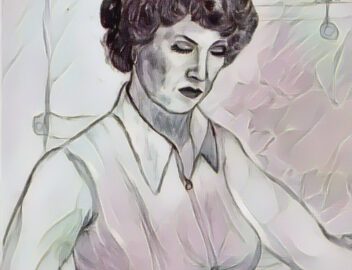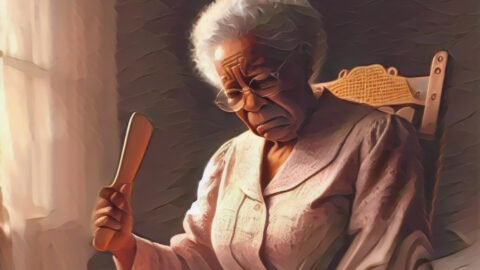My stepmother swept into our lives like a brisk autumn wind—thirty-five years old, with a past as mysterious as the creak of an old attic door. She arrived on Father’s arm, newly widowed from a doctor nearly twice her age, and with the poise of someone who’d spent years taming unruly children in the grandest homes.
She was not beautiful, but she had a presence—practical, sharp-eyed, and as relentless as a ticking clock. She married Father for security, and in return, she ruled our home with a queen’s iron will. Dust and disorder were her sworn enemies. She banished daydreams with a single glance, pressed needlework into my hands, and set Gabrielle to knitting and scrubbing. Our days of idle play vanished like mist at sunrise.
We soon learned our stepmother’s energy was boundless, her discipline unyielding. She demanded obedience as if it were a sacred rite, and her steel-green eyes could freeze us in our tracks. The air in our home grew taut with her expectations. Freedom became a memory, and punctuality was the new law—one minute late, and the world seemed to tilt.
Yet, for all her zeal, she kept her heart locked away from us. Her affection was reserved for Father, who basked in her attention, blissfully unaware of the storm she brought to our childhood.
The true turning point came one golden afternoon, when Gabrielle, now thirteen, lost track of time. The clock struck one, the table was set, and Gabrielle was nowhere to be seen. Lunch was served in silence, and when she finally tiptoed in at half past, she ate alone, the room heavy with unspoken tension.
Our stepmother’s eyes flashed with silent fury, but she said nothing while Father lingered. Gabrielle, ever hopeful, explained her tardiness—she’d walked a friend home, she said, believing the matter closed.
But as soon as Father’s footsteps faded, the air crackled. Our stepmother stormed into the room, cheeks aflame, and fixed Gabrielle with a gaze that could shatter glass. “At what time are you supposed to be home?” she demanded. “At one o’clock,” Gabrielle replied, her voice steady. “And today?” “At 1.30, because I walked my friend home.” “You know the rule. Now come with me!”
She seized Gabrielle’s arm and swept her into the next room, the door slamming shut behind them. I sat frozen, every muscle locked, as if the very air had thickened with dread. My heart pounded, and the world seemed to shrink to the space between those four walls.
Gabrielle’s pleas echoed through the door—promises, apologies, desperate bargains. But our stepmother was unmoved, her silence more terrifying than any shout. The key turned in the lock, sealing Gabrielle’s fate.
The house fell into a hush so deep I could hear the faintest creak of the floorboards. Then, the scrape of a chair, and our stepmother’s voice, cold and final: “My patience is at an end. If you will not listen, you must feel. The birch will teach you what words cannot.”
Gabrielle’s cries rose, wild and pleading, but the answer was the swish of the birch through the air—a sound that seemed to slice the afternoon in two. Her shrieks rang out, raw and unfiltered, each one a note in a terrible symphony. I trembled, every nerve alight, as the blows fell, relentless and uncountable.
That day, the world changed. The birch became our stepmother’s instrument of choice, always wielded with ceremony, always on the bare. From then on, the threat of the rod hung over us like a gathering storm. Each week, one or both of us would be summoned, the ritual as inevitable as the turning of the seasons.
Gabrielle, older and braver, was made to bare herself; I, younger, had my drawers pulled down for me. The first time I felt the birch, it was as if fire had been poured onto my skin—each stroke a brand, each moment stretching into eternity.
Father never witnessed these punishments. We lived in a constant state of watchfulness, measuring every word and action. Once, Gabrielle dared to complain to him, but he only shrugged: “You must have deserved it, my child.” The next time, our stepmother’s wrath was doubled, and Gabrielle never spoke of it again.
I learned to read our stepmother’s moods, searching her face for signs of impending judgment. There was a strange light in her eyes on those days—a fierce, almost joyful energy. She wielded the birch with slow, deliberate strokes, as if savoring each moment. The sensation was a strange mix of fear and fascination, a secret I carried deep inside.
As I grew older, I began to understand the peculiar power these rituals held over me. The memory of my stepmother’s flushed cheeks and shining eyes haunted my thoughts. I realized she took a certain pleasure in these punishments, finding reasons to summon us, her stepdaughters, for discipline.
At night, curiosity and dread mingled as I checked Gabrielle’s bruises—red streaks and blue-yellow marks, each one a silent testament to the day’s ordeal. The sight filled me with a trembling anticipation: who would be next?
Again and again, I found myself bent over a chair, the birch singing its fiery song across my skin. At first, we were bewildered by the ritual—her finger beckoning, her voice sharp: “Edith, come here!” But soon, we understood: the word ‘naked’ was her incantation, and shame her shadow.
My world was transformed. Childhood’s simple joys—homework, games, laughter—were now threaded with the thrill and terror of discipline. The birch became a strange, secret part of my education, a lesson my sisters never quite understood.



























































